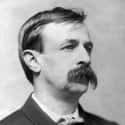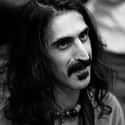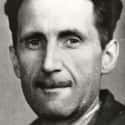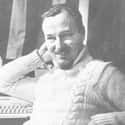-
(#7) Credit Cards
Sci-fi author Edward Bellamy wrote Looking Backward in 1888, and he was able to predict a future in which cash wasn't the only type of money. The story's plot involves a man from 1887 who falls asleep and wakes up in the year 2000. He describes this world's form of currency:
A credit card [is] issued him with which he procures at the public storehouses, found in every community, whatever he desires whenever he desires it. This arrangement, you will see, totally obviates the necessity for business transactions of any sort between individuals and consumers...
An American credit card... is just as good in Europe as American gold used to be, and on precisely the same condition, namely, that it be exchanged into the currency of the country you are traveling in.
Bellamy's ability to predict how credit and international banking would work is impressive since credit cards wouldn't be introduced until the 1950s.
-
(#9) Music Streaming Services
Frank Zappa is best known for his music, but he also predicted music file sharing and what would become music streaming back in the 1980s. In the chapter entitled "Failure" from his biography The Real Frank Zappa Book, he describes a proposition he pitched to label executives that included music "in a central processing location, and hav[ing it] accessible by phone or cable TV, directly patchable into the user's home taping appliances." This idea sounds a lot like file sharing, which would give birth to Napster and torrent sites a couple of decades later.
In the early 1980s, CDs were not the dominant format for consuming music yet. People were buying vinyl records that could warp in the heat or cassette tapes that could come apart and leave strands of the magnetic tape everywhere, jamming up the tape decks on stereo systems. Furthermore, recording songs directly from radio was a common practice that essentially led to a robust pirating black market for music.
Zappa's idea of direct access to music over phone or cable (mobile or broadband in present terms) was too ahead of its time for the execs to take seriously. Too bad for them, because the music industry's failure to quickly adopt a streaming service cost them billions of dollars and led to the industry's crash and the eventual folding of numerous record labels in the 2000s.
-
(#13) The Cold War
Author George Orwell not only predicted the Cold War in a 1945 essay, he popularized the term as it applied to events that followed World War II. His piece "You and the Atom Bomb" describes the future conflict between global capitalism and communism that resulted in worldwide anxiety related to the dangers of nuclear war:
We may be heading not for general breakdown but for an epoch as horribly stable as the slave empires of antiquity. James Burnham's theory has been much discussed, but few people have yet considered its ideological implications - that is, the kind of world-view, the kind of beliefs, and the social structure that would probably prevail in a state which was at once unconquerable and in a permanent state of "cold war" with its neighbors.
Just two years after Orwell wrote this, the Cold War began and dragged on until 1991.
Orwell is best known for writing 1984, in which he predicts a dystopian future police state and surveillance capabilities that allow those in power to intimidate people under the fear of constantly being watched. Much of the technology that made this type of "Big Brother" surveillance possible emerged during the Cold War.
-
(#1) Electric Cars
In 1969, author John Brunner published the sci-fi novel Stand on Zanzibar. In it, he describes the United States of America in the year 2010. One of the details in Brunner's story is that electric cars manufactured by Honda and others have become the preferred mode of transportation for most people.
In the real world, hybrid and electric cars were becoming a thing by 2010. Honda was producing cars with electric technology that year, though less successfully than their fellow Japanese competitor Toyota.
Electric cars are not the only thing predicted by Brunner. He envisioned a future involving rampant inflation, terrorist attacks on US soil, and Detroit techno. He also predicted a more open culture concerning sexual orientation. One of the more uncanny predictions made in Stand on Zanzibar is a President Obomi running the country. The spelling is so close to President Obama it's hard to ignore.
-
(#10) Great Fire of London
The most famous prognosticator of all time, Nostradamus, seemingly predicted the 1666 Great Fire of London with eerie accuracy. In his 1555 book Prophecies, the French soothsayer wrote a quatrain that many believe predicted the historic fire:
The blood of the just will commit a fault at London,
Burnt through lightning of twenty threes the six:
The ancient lady will fall from her high place,
Several of the same sect will be killed.The mayor of London at the time was Thomas Bloodworth. He had the chance to extinguish the blaze, but instead said “Pish! A woman might p*ss it out!”
The second line could be interpreted in two ways. "Burnt through lightning of twenty" could mean the sparks from the oven at the King's bakery on Pudding Lane, and "threes the six" might indicate the year 1666. "The six" may also refer to the six recorded casualties, although many more people likely died but were not counted. Taken another way, "twenty threes the six" could mean (20 x 3) + 6 = 66, also referring to the year.
The final clue is, "Several of the same sect will be killed." After the blaze subsided, many blamed Catholics for the fire, and deadly riots erupted.
-
(#4) Organ Transplants
- Book
Robert Boyle was such a prolific scientist that he has an actual scientific law named after him. That's impressive enough, but Boyle also had a list of ideas he wrote sometime around the 1660s that predicted several things that would come to be centuries later.
Upon his death in 1691, this now-famous wishlist was discovered among Boyle's papers. A mention of "making armor light and extremely hard'' seems like a prediction of Kevlar body armor.
The technology that makes bulletproof body armor was discovered by inventor Stephanie Kwoleck in 1971, over 300 years after Boyle's prediction. What other predictions were on Boyle's list? He was able to foresee organ transplants, scuba equipment, airplanes, and even scratch-and-sniff paper.
New Random Displays Display All By Ranking
About This Tool
Einstein once said, if an idea is not absurd at first, then it has no meaning. In the history of human invention, various strange and even useless ideas emerge endlessly. Although it is a waste of manpower and material resources, no one can deny that these ideas make the boring life more interesting, and even inspired the creative inspiration of some genius inventors, who finally produced more efficient new tools.
Hundreds of years ago, absolutely no one could have predicted that humans would be able to set foot on the moon. Perhaps many people laughed at these absurd ideas at that time, but now this dream has come true. With the generator, you could find random the weirdest ideas in history that somehow came true now, such as Electric Cars, Wi-Fi Technology, and more.
Our data comes from Ranker, If you want to participate in the ranking of items displayed on this page, please click here.












